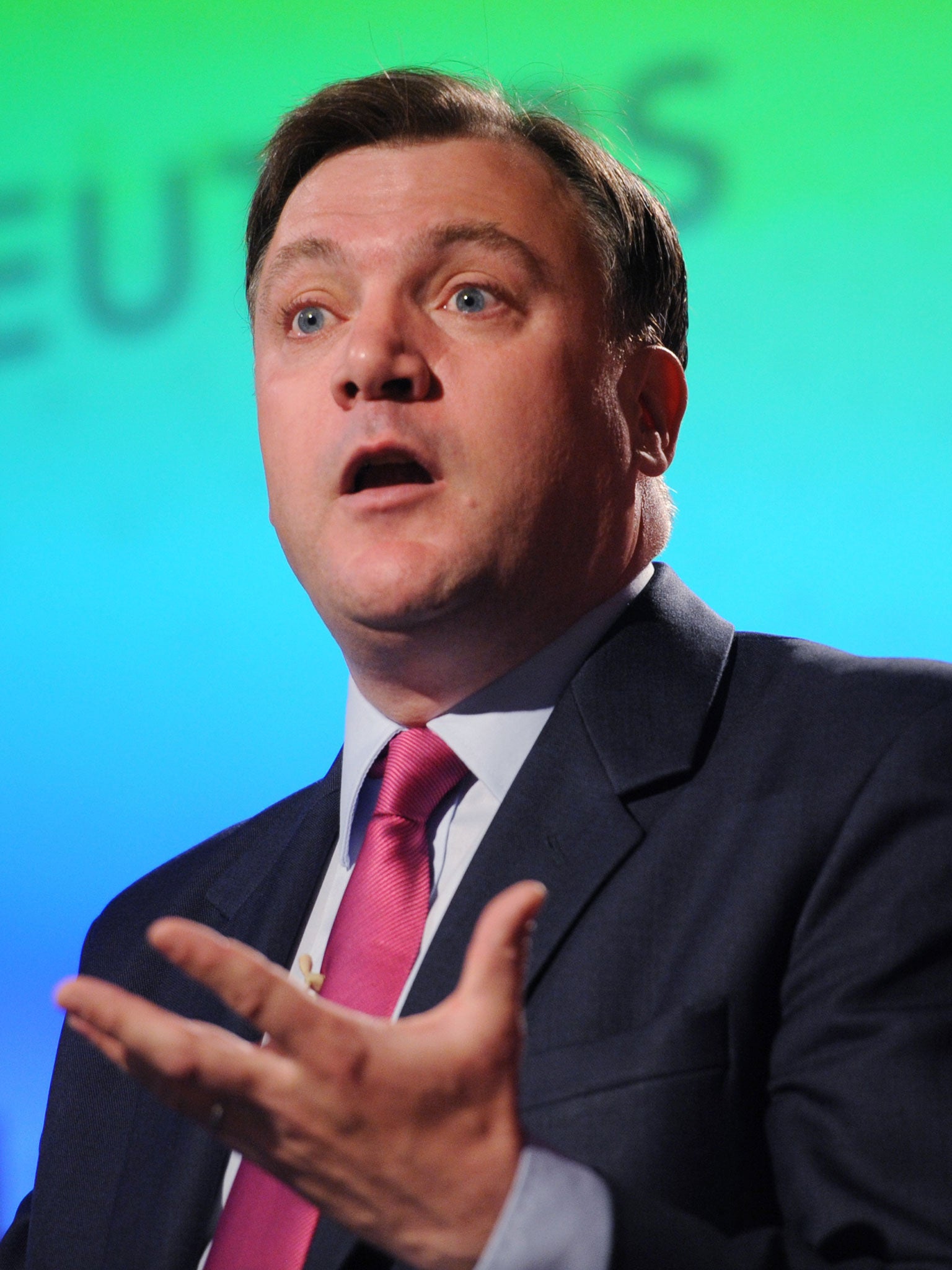Labour conference: Ed Balls to call in spending watchdog to audit 2015 election manifesto
Poll reveals Labour’s plans for greater infrastructure spending could propel party to election victory

Your support helps us to tell the story
From reproductive rights to climate change to Big Tech, The Independent is on the ground when the story is developing. Whether it's investigating the financials of Elon Musk's pro-Trump PAC or producing our latest documentary, 'The A Word', which shines a light on the American women fighting for reproductive rights, we know how important it is to parse out the facts from the messaging.
At such a critical moment in US history, we need reporters on the ground. Your donation allows us to keep sending journalists to speak to both sides of the story.
The Independent is trusted by Americans across the entire political spectrum. And unlike many other quality news outlets, we choose not to lock Americans out of our reporting and analysis with paywalls. We believe quality journalism should be available to everyone, paid for by those who can afford it.
Your support makes all the difference.Labour has asked the Government’s independent tax and spending watchdog to audit its 2015 election manifesto in an attempt to head off Conservative attacks that the party would spend recklessly.
The unprecedented move to call in the Office for Budget Responsibility (OBR) is part of Labour’s drive to win economic credibility. It will be announced by Ed Balls on Monday as he issues a tough warning to the party conference that Labour would need to impose deep spending cuts if it regains power, even though the economy is growing again.
The shadow Chancellor faces a backlash over his strategy at the Brighton conference. Trade unions are threatening to defeat the party leadership today by proposing an end to the 1 per cent ceiling on public sector pay rises, which Mr Balls supports.
Dave Prentis, the leader of Unison, will propose a motion opposing the cap and unions are confident the conference will endorse it.
In his speech, Mr Balls will reiterate Labour’s pledge to stick to the Coalition’s day-to-day spending limit for the 2015-16 financial year. But a new survey suggests the promise is not bringing the party any electoral benefit.
Some 10 per cent of the public said it would make them more likely to vote Labour but 10 per cent believed it would make them less likely to do so, according to the YouGov poll for the Labour Uncut blog.
Promising no cuts in public spending and higher borrowing, as some unions demand but Labour rejects, would make 12 per cent of the public more likely to vote for the party but 16 per cent less likely.
But Ed Miliband’s plan for Labour to borrow more than the Coalition for building projects such as housing could enhance the party’s prospects, the poll found. Some 17 per cent of people thought it would make them more likely to vote Labour and 13 per cent less likely.
Writing on The Independent’s website, Jonathan Todd of Labour Uncut said such a pledge could be “pivotal” at the election as a 4 per cent rise in Labour’s vote could be worth up to 52 extra seats. It could make “the difference between Labour becoming the government or remaining in opposition,” he said.
Labour has called for an extra £10bn to be spent on infrastructure to boost economic growth and one manifesto idea is a pledge to build five million homes in five-year parliament.
Mr Balls’s decision to ask the OBR to vet Labour’s programme came as the Conservatives claimed that Labour has clocked up £27.9bn of spending pledges since June – a charge dismissed as “nonsense” by Labour.
Mr Balls will tell the conference: “The British people rightly want to know that the sums add up. So we will go one step further and ask the independent OBR – the watchdog set up by this Government – to audit the costings of every individual spending and tax measure in Labour’s manifesto at the next election.”
He will add: “This is the first time a shadow Chancellor – the first time any political party in Britain – has ever said it wants this kind of independent audit. A radical change from what’s gone before, but the right thing to do to help restore trust in politics.”
Mr Balls will say: “We won’t be able to reverse all the spending cuts and tax rises the Tories have pushed through. The next Labour government will have to make cuts too. Because, while jobs and growth are vital to getting the deficit down, they cannot magic the whole deficit away at a stroke.”
The Tories claimed Labour’s new policies were “unravelling”, as business leaders attacked Mr Miliband’s announcement that a Labour government would require large companies to offer a new apprenticeship place each time they hire a skilled worker from outside the European Union.
The plan, part of an immigration Bill in the first parliamentary session if Labour regains power, could create 125,000 new apprenticeships over five years. But the British Chambers of Commerce denounced it as an “apprentice tax” while the Institute of Directors claimed it was “completely removed from reality”.
Matthew Hancock, the Skills minister, said Labour’s “unworkable apprenticeship scheme” would be illegal unless it were open to all EU citizens, encouraging more immigration.
But Labour dismissed Mr Hancock’s comments as “ludicrous”, saying the vast majority of apprenticeships went to local people even though they were already open to EU citizens.
Join our commenting forum
Join thought-provoking conversations, follow other Independent readers and see their replies
Comments